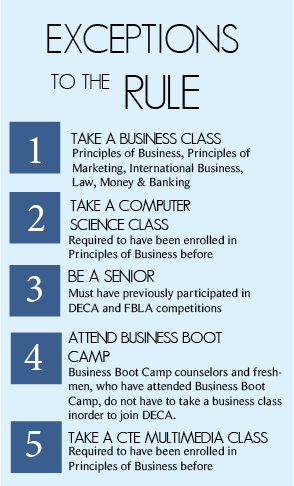However, after participating in a few conferences, studying with her friends on a bus at 4 a.m., and consoling team members after losses at conferences, she began to devote more time and attention, eventually realizing that FBLA was more than just an organization or a club.
It was a family.
When she received the email on Aug. 24 notifying her that she could no longer be a part of FBLA, she was heartbroken.
“It was like losing a family,” she said. It felt like I was disowned.”
Both clubs have been hurt by the rule change. DECA has lost 30-40 award winning members, and FBLA has lost 20-30 competitively successful members.
Core of the Issue
According to Principal April Scott, the rule change was a matter of stricter adherence to the definition of a Career and Technical Student Organization. A CTSO is defined as an organization in which ìindividuals are enrolled in a career and technical education program.

ìIt was tightening up that definition of a CTSO, aligning it to that course of study and saying that ëto be in one organization, you must be in an organization thatís tied to the course of study,î Scott said.
After the California AB 1575 bill passed in August 2012, DECA and FBLA, along with other clubs, could no longer receive funding from membership dues, which were used to cover the organizational aspects, such as the printing and event-related costs, as well as annual fees to the national DECA and FBLA organizations. Previously, DECA’s membership fee was $50 and FBLAís was $35.
“We spend a lot of money making the membership experience better,” a DECA officer, who spoke to El Estoque on the condition that he not be named, said. “It all gets reinvested into the members.”
“We spend a lot of money making the membership experience better,” an anonymous senior DECA officer said. “It all gets reinvested into the members.”
Although DECA and FBLA had always been CTSOís and had been receiving funding from the Carl D. Perkins Fund for three to four years now, they had not been following the rules. According to Krithika Rao, Vice President of Operations at Silicon Valley, DECA and FBLA have been CTSOs since 2006, and have been receiving funding since 2008.
The Carl D. Perkins Act, which was passed in 2006, aims to increase interest in career technical course and provides approximately $1 billion in funding across the 50 states. According to the CTSO Guide to Accessing Federal Perkins Funds, to receive funding, a CTSO program must “coordinate and

enhance the delivery of the state curriculum,” and schools must report their annual progress to the government.
In previous years, however, business department chair Carl Schmidt had reported that DECA and FBLA members were all in business classes in order to receive and collect funding. Despite the funding from the state, DECA and FBLA are still raising prices this year. Fees for national level competitions are expected to rise about 100 dollars this year because according to Schmidt, money from the Carl D. Perkins fund allocated to DECA and FBLA only cover about 1-2 percent of each organizationís costs.
“[With this rule change] the business classes are forced to grow and become more of a legitimate four-year program,” he said.
According to the officer, some other schools in the country already have business courses geared primarily toward DECA competitions, so he believes that Schmidt wants to equalize the playing field.
Rao also believes that Schmidt may have also wanted to boost DECA and FBLAís competitive results. Last year, DECA fell from first to second place and FBLA fell from second to seventh place.
“Its not just money, money is part of the issue,” Rao said. “[Schmidt] wants to make sure that every student in Monta Vista DECA is serious about doing competitions.”
Schmidt, however, believes that the rule change was a matter of following the CTSO rule, rather than helping DECA and FBLA perform better at competitions.
Mixed opinions of the rule
The new membership rule has sidelined several students. Part of this issue is due to the lack of communication. Although members from DECA were informed two weeks before the start of school, FBLA members were informed about the rule change a week after school started. It was due to the lack of communication that members from both organizations were unable to receive a schedule change.
According to Scott, students were only moved into a business class if their schedules permitted them to do so.
“The only accommodation would be [for a schedule that] requires zero schedule changes, for example, if they have a hole…we are not going to have it affect another elective program,” Scott said.
Although members from both sides had to make changes to their schedules, the rule has severely affected students, preventing many from competing for their organization.
In an online survey of 399 students, 76 percent of students believe that the new change is not needed. Although Liu understands the reasons for the rule, she would like to see more exceptions made.
“We feel this year should be more of a transition year, but the exceptions are not as inclusive as we would have wanted [them] to be,” Liu said.
Looking Ahead
In the long run, the DECA officer believes that the rule change will benefit DECA and FBLA since he predicts that business class enrollment will swell to between 300 and 400 students, boosting the clubsí membership counts, and making the students better competitors
ìIn an ideal world … maybe three-fourths of a business class’ members are avid competitors, and theyíre all working really hard to get that A, which will in turn make them better competitors,î he said.
However, although the rule may benefit clubs in the long run, he acknowledges that the rule change may hurt DECA and FBLA’s competitive changes this year.
“[Schmidt] wants to be number one in the world on a different timeframe,” the DECA officer said. “[The club wants] to be number one in the world this year.”
Due to clubsí concern for their competitive success this year, groups of students and officers from both business clubs have met with Schmidt and Scott regarding exceptions to the rule. FBLA members Liu and junior Radhika Dhomse started a petition calling for more exceptions to the rule and asking for explanations from administration and Schmidt.
So far, some exceptions have been made although they will only last for this year. However, Liu believes that further exceptions could be made if more members would speak out against the rule.
“A lot of people think this is unfair… I know that there are a lot of people that want these changes to be made, but they didn’t want to take a stand for it,” Liu said. “They just lost hope.”
New business classes, as of now, will not be created in order to accommodate students who want to add a class due to the short-term notice and the fact that MVHS can only have 418 sections, so adding new business classes would mean cutting down on classes in other departments.
Scott believes that most of the confusion stemming from the rule change was due to the lack of communication between the clubs and their members. In order to prevent this in the future, administration and the clubs will make communication a priority.
ìItís going to be over and over and over in every single mode of communication that we can think about, and weíre just going to lay it out very clearly,î Scott said.
According to Scott, the information will be disseminated through the FBLA and DECA websites and through informational flyers that will be handed out to students.
In addition, Scott believes that the chaos and confusion due to the rule change will reduce in the coming time. She compares it to a time when FUHSD had to limit the number of science classes a student could take at one time due to budget cuts. After the rule change, Scott made sure to continuously inform all parents and students.
“[We] said it a thousand times,” Scott said. “[We] said it in every single way you could say it. Nobody got caught off guard.”
Scott believes that in the future, the controversy will fade away.
“We are walking into unknown territory,” she said. “This year is the year that [DECA and FBLA] are trying to be strict, and itís the rockiest year,î Scott said. “[However], I’ve dealt with these types of turmoils. This will die down.”




















